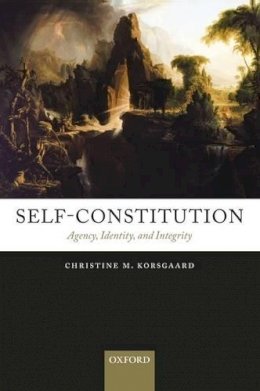
Stock image for illustration purposes only - book cover, edition or condition may vary.
Self-Constitution: Agency, Identity, and Integrity
Christine M. Korsgaard
€ 41.99
€ 41.78
FREE Delivery in Ireland
Description for Self-Constitution: Agency, Identity, and Integrity
Paperback. Christine M. Korsgaard presents an account of the foundation of practical reason and moral obligation, based on a new theory of action and interaction. She proposes that the function of an action is to constitute the agency and therefore the identity of the person who does it, and that only morally good action can serve this function. Num Pages: 248 pages. BIC Classification: HPM; HPQ. Category: (UP) Postgraduate, Research & Scholarly. Dimension: 233 x 155 x 14. Weight in Grams: 386.
Christine M. Korsgaard presents an account of the foundation of practical reason and moral obligation. Moral philosophy aspires to understand the fact that human actions, unlike the actions of the other animals, can be morally good or bad, right or wrong. Few moral philosophers, however, have exploited the idea that actions might be morally good or bad in virtue of being good or bad of their kind - good or bad as actions. Just as we need to know that it is the function of the heart to pump blood to know that a good heart is one that pumps blood successfully, so we need to know what the function of an action is in order to know what counts as a good or bad action. Drawing on the work of Plato, Aristotle, and Kant, Korsgaard proposes that the function of an action is to constitute the agency and therefore the identity of the person who does it. As rational beings, we are aware of, and therefore in control of, the principles that govern our actions. A good action is one that constitutes its agent as the autonomous and efficacious cause of her own movements. These properties correspond, respectively, to Kant's two imperatives of practical reason. Conformity to the categorical imperative renders us autonomous, and conformity to the hypothetical imperative renders us efficacious. And in determining what effects we will have in the world, we are at the same time determining our own identities. Korsgaard develops a theory of action and of interaction, and of the form interaction must take if we are to have the integrity that, she argues, is essential for agency. On the basis of that theory, she argues that only morally good action can serve the function of action, which is self-constitution.
Product Details
Publisher
Oxford University Press United Kingdom
Number of pages
248
Format
Paperback
Publication date
2009
Condition
New
Number of Pages
248
Place of Publication
Oxford, United Kingdom
ISBN
9780199552801
SKU
V9780199552801
Shipping Time
Usually ships in 4 to 8 working days
Ref
99-4
About Christine M. Korsgaard
Christine M. Korsgaard earned her B.A. at the University of Illinois in 1974, her Ph.D. at Harvard University, where she studied with John Rawls, in 1981, and an LHD at the University of Illinois in 2004. She is currently Arthur Kingsley Porter Professor of Philosophy at Harvard University. She works on moral philosophy and its history, practical reason, agency, personal identity, and the relations between human beings and the other animals.
Reviews for Self-Constitution: Agency, Identity, and Integrity
a truly remarkable achievement, readable, learned, humane, and passionate. It is also beautifully written. Above all, it is exciting.
Timothy Chappell, Philosophy
Timothy Chappell, Philosophy
